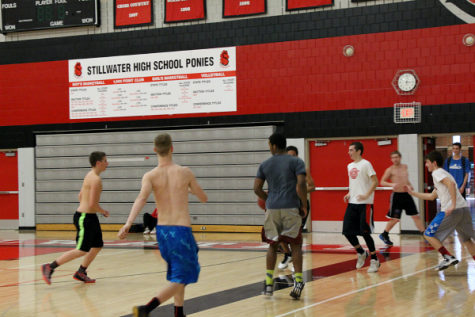Balancing competing pressures
April 11, 2015

Often times, the amount of pressure placed on one’s shoulders, either from themselves or from others, can cause an overload of unnecessary stress. “It’s a mental game sometimes,” said junior Seth Cattanach.
Everyday students face an onslaught of anxiety and stress. Competition and athletics can be a leading factor to the high levels of stress students feel. Stress can be both healthy and unhealthy. When given the right amount of push, stress can give the extra boost needed to compete well. In the wrong situation, push can cause distress and a feeling of being overwhelmed.
Sometimes, stress can be a good factor during competition. Eustress is the type of stress that is healthy to experience. It gives the needed adrenaline for the extra push to win or perform well.
“Before [track] meets I do get stressed, especially right before the gun goes off, but that nervous butterfly feeling seems to help get me focused on the race. All stress ceases once the gun goes off,” said junior Abrielle Prunty.
Often times, the amount of pressure placed on one’s shoulders, either from themselves or from others, can cause an overload of unnecessary stress.
“It’s a mental game sometimes. I do not want to stress myself out too much before a [tennis] match, but it happens, especially before a big match. It can be hard though, especially if my match ends up deciding the match for the team. I am super competitive and probably put a lot of pressure on myself, but the team is really supportive. Anytime I start over-thinking my match or put too much pressure on myself, I don’t play as well, which is probably similar in a lot of sports,” said junior Seth Cattanach.
The pressure to not let down coaches or teammates is a huge factor to the amount of stress students feel from competition. Depending on whether it is a team sport or an individual sport, the pressure varies. If it is a team sport, teammates rely on each other to succeed.
“I feel stress before a [baseball] game. I get pumped. There is a lot of pressure to win. I want to represent my school and do the best I possibly can and hopefully win the game while doing so. I feel pressure from my teammates the most. I want to win for the coaches as well, but for us players we share a special bond. We are a family. The pressure probably helps me play better. It keeps my mind clear of things that may distract me and help me focus on the task at hand,” said junior Alex Barrett.
Even if the sport or activity does not cause anxiety, the amount of time athletes are practicing takes away from the time for family or homework. Sometimes is it difficult to find time to fit everything in and still sleep enough to have energy for the next day.
“I have track practice after school everyday for two hours from three to five and occasionally on Saturdays. It definitely takes a lot of time management to try and juggle school work and track. During the week, to quote an old saying, I feel like I am a chicken running around with its head chopped off because I have to be from one place to the next quickly, and trying to fit everything into a 24-hour day is difficult. It’s [definitely] manageable, it just takes a little more focus and a little less sleep,” said Prunty.
Stress leading up to an event or game can be even more stressful than the competition itself. When a large tournament, game, meet, match or competition is approaching, it may become more difficult to concentrate on school work, extracurricular activities or get a sufficient amount of sleep.
“It can be impossible sometimes, trying to balance school, sports and music. A lot of times I have to catch up during the weekends, but it is definitely worth it,” commented Cattanach.
“Stress. It’s just a sacrifice that I am willing to make to play a sport I love,” said Barrett.










